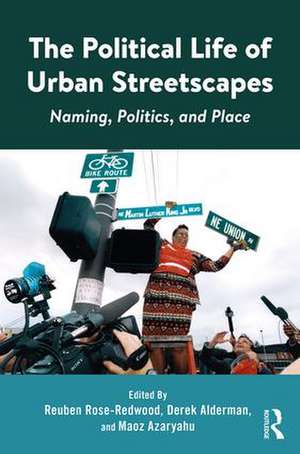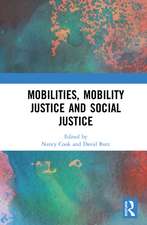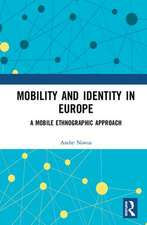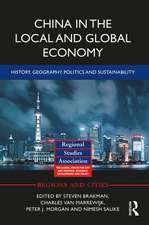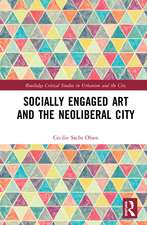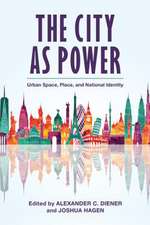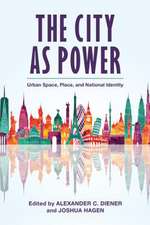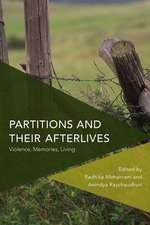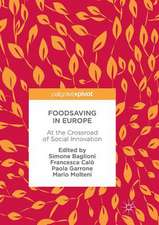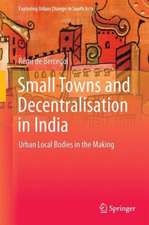The Political Life of Urban Streetscapes: Naming, Politics, and Place
Editat de Reuben Rose-Redwood, Derek Alderman, Maoz Azaryahuen Limba Engleză Hardback – 6 iul 2017
| Toate formatele și edițiile | Preț | Express |
|---|---|---|
| Paperback (1) | 391.35 lei 43-57 zile | |
| Taylor & Francis – 30 sep 2020 | 391.35 lei 43-57 zile | |
| Hardback (1) | 1006.60 lei 43-57 zile | |
| Taylor & Francis – 6 iul 2017 | 1006.60 lei 43-57 zile |
Preț: 1006.60 lei
Preț vechi: 1227.57 lei
-18% Nou
Puncte Express: 1510
Preț estimativ în valută:
192.62€ • 201.61$ • 160.31£
192.62€ • 201.61$ • 160.31£
Carte tipărită la comandă
Livrare economică 31 martie-14 aprilie
Preluare comenzi: 021 569.72.76
Specificații
ISBN-13: 9781472475091
ISBN-10: 1472475097
Pagini: 356
Ilustrații: 36
Dimensiuni: 156 x 234 x 23 mm
Greutate: 0.64 kg
Ediția:1
Editura: Taylor & Francis
Colecția Routledge
Locul publicării:Oxford, United Kingdom
ISBN-10: 1472475097
Pagini: 356
Ilustrații: 36
Dimensiuni: 156 x 234 x 23 mm
Greutate: 0.64 kg
Ediția:1
Editura: Taylor & Francis
Colecția Routledge
Locul publicării:Oxford, United Kingdom
Cuprins
1. The Urban Streetscape as Political Cosmos 2. Reading Street Names Politically: A Second Reading 3. Colonial Urban Order, Cultural Politics, and the Naming of Streets in Nineteenth- and Early Twentieth-Century Singapore 4. Revisiting East Berlin and Haifa: A Comparative Perspective on Renaming the Past 5. "Armed with an Encyclopedia and an Axe": The Socialist and Post-Socialist Street Toponymy of East Berlin Revisited Through Gramsci 6. Building a New City Through a New Discourse: Street Naming Revolutions in Budapest 7. Locating the Geopolitics of Memory in the Polish Streetscape 8. Toponymic Changes as Temporal Boundary-Making: Street Renaming in Leningrad/St. Petersburg 9. The Spatial Codification of Values in Zagreb’s City-Text 10. Nationalizing the Streetscape: The Case of Street Renaming in Mostar, Bosnia and Herzegovina 11. The Politics of Toponymic Continuity: The Limits of Change and the Ongoing Lives of Street Names 12. Toponymic Complexities in Sub-Saharan African Cities: Informative and Symbolic Aspects from Past to Present 13. Coloring "Rainbow" Streets: The Struggle for Toponymic Multiracialism in Urban Post-Apartheid South Africa 14. Street Renaming, Symbolic Capital, and Resistance in Durban, South Africa 15. Street Naming and the Politics of Belonging: Spatial Injustices in the Toponymic Commemoration of Martin Luther King, Jr. 16. From Number to Name: Symbolic Capital, Places of Memory, and the Politics of Street Renaming in New York City 17. Toponymic Checksum or Flotsam? Recalculating Dubai’s Grid with Makani, "the Smartest Map in the World" 18. Contemporary Issues and Future Horizons of Critical Urban Toponymy
Notă biografică
Reuben Rose-Redwood is an Associate Professor of Geography and Chair of the Committee for Urban Studies at the University of Victoria in British Columbia, Canada. His research focuses on the cultural politics of place naming, geographies of urban memory, and the spatial history of the geo-coded world. He is the co-editor of Performativity, Politics, and the Production of Social Space (2014) and has published in a broad range of scholarly journals, including Progress in Human Geography, Social & Cultural Geography, Urban History, and the Annals of the Association of American Geographers. His work on the historical geography of New York’s urban streetscape has also been featured in various popular media outlets, such as the Discovery Channel, the History Channel, and the New York Times.
Derek Alderman is a Professor in the Department of Geography at the University of Tennessee, USA. His research interests and published work focus on the role of place and street naming in the context of African American identity politics and civil rights struggles in the southeastern United States. He is co-author of Civil Rights Memorials and the Geography of Memory (2008) and is perhaps best known for advancing scholarly and public understanding of the politics of naming streets after Martin Luther King, Jr. He is also frequently sought after by the news media to comment on this and other cultural issues
Maoz Azaryahu is a Professor of Cultural Geography at the University of Haifa, Israel. His research focuses on urban and landscape semiotics as well as the cultural and historical geographies of national myths and public memory in Israel and Germany, landscapes of popular culture, the politics of street naming, and the cultural history of places and landscapes. He is the author of numerous books and articles, including Von Wilhelmplatz zu Thälmannplatz: Politische Symbole im Öffentlicehn Leben der DDR (1991), State Cults: Celebrating Independence and Commemorating the Fallen in Israel 1948-1956 (1995, in Hebrew), Tel Aviv: Mythography of a City (2006), and Namesakes: History and Politics of Street Naming in Israel (2012, in Hebrew).
Derek Alderman is a Professor in the Department of Geography at the University of Tennessee, USA. His research interests and published work focus on the role of place and street naming in the context of African American identity politics and civil rights struggles in the southeastern United States. He is co-author of Civil Rights Memorials and the Geography of Memory (2008) and is perhaps best known for advancing scholarly and public understanding of the politics of naming streets after Martin Luther King, Jr. He is also frequently sought after by the news media to comment on this and other cultural issues
Maoz Azaryahu is a Professor of Cultural Geography at the University of Haifa, Israel. His research focuses on urban and landscape semiotics as well as the cultural and historical geographies of national myths and public memory in Israel and Germany, landscapes of popular culture, the politics of street naming, and the cultural history of places and landscapes. He is the author of numerous books and articles, including Von Wilhelmplatz zu Thälmannplatz: Politische Symbole im Öffentlicehn Leben der DDR (1991), State Cults: Celebrating Independence and Commemorating the Fallen in Israel 1948-1956 (1995, in Hebrew), Tel Aviv: Mythography of a City (2006), and Namesakes: History and Politics of Street Naming in Israel (2012, in Hebrew).
Recenzii
"Themes across this edited collection include the legacy of colonial and postcolonial naming practices (as in Southeast Asia and South Africa), the use of street naming to stoke nationalism (as in postsocialist Europe), and the way street names intersect with racial, gender, and class identities (as in the identity-conscious US). These chapters make it abundantly clear that urban street naming is often a political process, rather than an innocently commemorative or descriptive exercise." - Christine Ro, Environment & Urbanization Journal
Descriere
Streetscapes are part of the taken-for-granted spaces of everyday urban life, yet they are also contested arenas in which struggles over identity, memory, and place shape the social production of urban space. This book examines the role that street naming has played in the political life of urban streetscapes in both historical and contemporary cities. Covering a wide range of case studies from cities in Europe, North America, Sub-Saharan Africa, and Asia, the contributions to this volume illustrate how the naming of streets has been instrumental to the reshaping of urban spatial imaginaries and the cultural politics of place.
